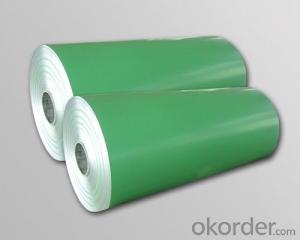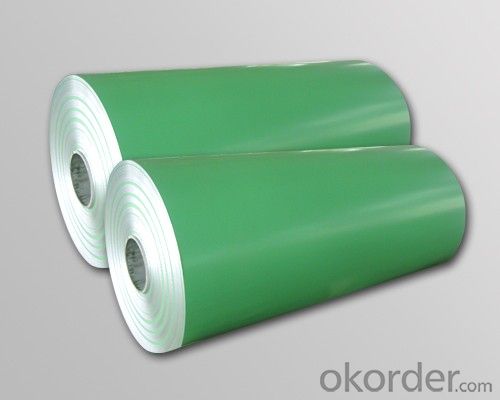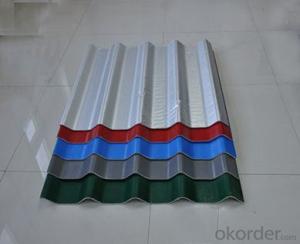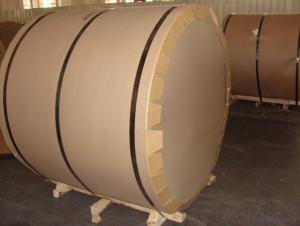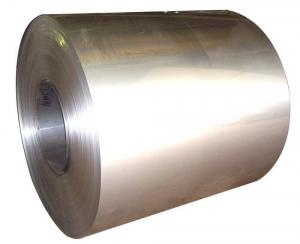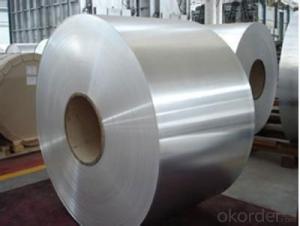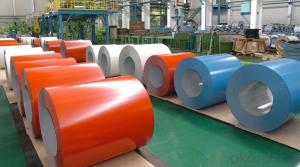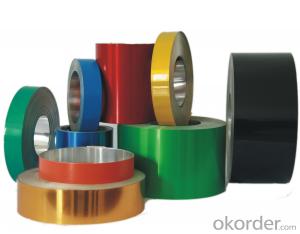Aluminum Sheets 025 Coated Aluminum Coils for Roofing-AA1XXX
- Loading Port:
- China Main Port
- Payment Terms:
- TT OR LC
- Min Order Qty:
- -
- Supply Capability:
- -
OKorder Service Pledge
OKorder Financial Service
You Might Also Like
Product Description:
1 Specifications of PE Coated Aluminum Coil/Sheet
Alloy | AA1050,AA1060, AA1070, AA1100, AA3003, AA3004, AA3005, AA3105, AA5005, AA5052, AA5754, AA5083, AA8011 |
Temper: | H12, H14, H16, H18, H22, H24, H26, H32,HO, F |
Thickness: | 0.10-4.0mm |
Width: | 10mm- 2000mm |
Coating | PE(Polyester) |
Painting Thickness | Standard 16-25 microns, max 40 microns |
Color | Acording to Ral colors or customer’s samples |
Standard: | GB/T17748-1999, ASTM, ISO, EU standard |
Special Specification is available on customer’s requirement | |
PE(polyester) Coating
PE(polyester) coating:high molecular polymer as monomer and addition of alkyd, is an UV-resistant coating. It can be classified matt and glossy according to coating gloss. The compact molecule structure, makes paint surface luster and smooth,which assure good printing on the panel surface. With an warranty of 8-10 years for weather resistance, it is specially applied for internal decoration and sign board.
2 Usage/Applications of PE Coated Aluminum Coil/Sheet
Our company's PE Coated Aluminum Coil/Sheet have been widely used in the fields of construction and decoration(garage doors, ceiling etc.), electronic appliances, lighting decoration, air-condition air pipe, sanwich panels and drainage, etc.
- Q: What are the maximum dimensions available for aluminum sheets?
- The available dimensions for aluminum sheets depend on a variety of factors, including the manufacturing process, supplier capabilities, and customer requirements. However, standard sizes for aluminum sheets typically range from 0.02 inches (0.5 mm) to 0.25 inches (6.35 mm) in thickness. The widths can vary from 24 inches (609.6 mm) to 72 inches (1828.8 mm), while the length can generally extend up to 144 inches (3657.6 mm). It is worth noting that these dimensions may differ depending on the specific supplier or manufacturer, and customized sizes can be produced to meet individual needs.
- Q: What are the standard dimensions of aluminum sheets?
- The specific industry and application determine the varying standard dimensions of aluminum sheets. However, there are commonly available sizes that are commonly used. For general purposes, aluminum sheets are commonly found in dimensions of 4 feet by 8 feet (1219mm x 2438mm) and 4 feet by 10 feet (1219mm x 3048mm). These dimensions, often referred to as "full sheets," are widely used in construction, manufacturing, and signage industries. Aside from full sheets, smaller sizes of aluminum sheets are also available, such as 2 feet by 4 feet (609mm x 1219mm) and 2 feet by 8 feet (609mm x 2438mm). These smaller sizes are commonly used for DIY projects, crafts, and hobbies. It is important to note that although these dimensions are standard, aluminum sheets can be custom cut to meet specific sizes and shapes for individual project requirements. This provides greater flexibility and versatility across various industries. Ultimately, the choice of aluminum sheet dimensions depends on the specific needs of the project, industry standards, and personal preferences.
- Q: Are aluminum sheets suitable for architectural facades?
- Yes, aluminum sheets are highly suitable for architectural facades. They offer numerous benefits such as durability, lightweight construction, corrosion resistance, and versatility in design. Aluminum sheets can be easily shaped and formed into various sizes and shapes, allowing for creative and unique architectural designs. Additionally, their ability to withstand harsh weather conditions makes them a reliable choice for long-lasting facades.
- Q: What is the typical shear strength of aluminum sheets?
- The shear strength of aluminum sheets can vary depending on several factors, including the alloy, temper, thickness, and manufacturing process. Typically, common aluminum alloys have a shear strength ranging from 207 to 310 megapascals (MPa) or 30,000 to 45,000 pounds per square inch (psi). It is crucial to understand that these values serve as general guidelines, and specific applications and conditions may result in variations. When dealing with critical applications, it is advisable to refer to the material specifications or consult professionals to accurately determine the shear strength requirements for the specific aluminum sheet in use.
- Q: What is the weight of an aluminum sheet?
- The weight of an aluminum sheet can vary depending on its thickness and dimensions.
- Q: Can aluminum sheets be used for battery casings?
- Yes, aluminum sheets can be used for battery casings. Aluminum is a commonly used material in the manufacturing of battery casings due to its lightweight, corrosion-resistant, and durable properties. It also allows for efficient heat dissipation, making it suitable for various types of batteries.
- Q: What are the different types of patterns available for textured aluminum sheets?
- Textured aluminum sheets offer a variety of patterns, each with its own unique visual appeal and functionality. Some commonly used patterns include: 1. Diamond pattern: Also called tread plate or checker plate, this pattern features small raised diamonds on the sheet's surface. It provides excellent slip resistance, making it ideal for applications that require traction, such as ramps, stairs, or industrial flooring. 2. Stucco pattern: Resembling a textured wall or ceiling finish, the stucco pattern has raised ridges that create a rough and bumpy surface. It is often used for decorative purposes, adding depth and visual interest to architectural elements like walls, ceilings, or furniture. 3. Hammered pattern: Mimicking the appearance of a surface hammered by hand, the hammered pattern creates a dimpled and uneven texture. It is commonly used in architectural applications, such as wall panels, backsplashes, or decorative accents, to add a rustic and artistic touch. 4. Brushed pattern: The brushed pattern is achieved by brushing the surface of the aluminum sheet with a wire brush, creating long, uniform lines. It offers a sleek and modern appearance, making it popular for applications like kitchen appliances, signage, or interior design elements. 5. Perforated pattern: Unlike the previous patterns, the perforated pattern involves creating small holes across the aluminum sheet's surface. This pattern is often used in applications that require ventilation, sound absorption, or decorative effects, such as speaker grills, filters, or façades. These examples highlight the range of patterns available for textured aluminum sheets. The choice of pattern depends on the specific project requirements, including aesthetics, functionality, and durability.
- Q: who knows the ceiling technology of aluminum sheet?
- Different materials usually have difference in construction technology. The detailed ceiling construction technology process of aluminum buckle plate:1, snapping line: according to the elevation horizontal line of floor, designed elevation, surrounding ceiling elevation horizontal line, you can find the central point of your room. Then alone the ceiling’s elevation horizontal line, take the central point of your room as focus, you can draw the grading line of keel. 2, install main keel boom: after ensuring the ceiling’s elevation horizontal line and keel’s location line, you can measure the elevation of the below ending of boom, and install the boom processed before. You can use expansion bolt to fix the boom on ceiling. Choose round steel as boom, control the gap of hanging bar under the range of 1200mm.3, install main keel: choose C38 light steel keel as main keel, control the gap under 1200mm. connect it with fitting and boom matched with main keel while installing. 4, install side keel: fix 25×25mm coated keel on the surrounding wall with cement nail according to net height of ceiling, control the cement nail’s gap under 300mm. 5, install sub keel: install the sub keel matched with aluminum buckle plate according to the size of aluminum buckle plate, hang the sub keel on main keel through hanger. When the sub keel needs to be prolonged by several keel, use the adapting piece of sub keel, connect the two ends and fix them after straightening at the same time of hanging the sub keel.
- Q: I saw a nice looking set of cast aluminum pots for a very good price. They feel very heavy. But I remember hearing that aluminum is not healthy so I am wary of buying them. Any advice would be appreciated.
- Cast Aluminum Pots
- Q: How do aluminum sheets perform in terms of weather resistance?
- Aluminum sheets are highly weather-resistant due to their natural oxide coating, which provides excellent corrosion resistance against various weather elements such as rain, snow, UV radiation, and temperature changes. This oxide layer acts as a protective barrier, preventing the metal from further oxidation and degradation. Consequently, aluminum sheets retain their structural integrity and appearance even when exposed to harsh weather conditions for extended periods.
Send your message to us
Aluminum Sheets 025 Coated Aluminum Coils for Roofing-AA1XXX
- Loading Port:
- China Main Port
- Payment Terms:
- TT OR LC
- Min Order Qty:
- -
- Supply Capability:
- -
OKorder Service Pledge
OKorder Financial Service
Similar products
Hot products
Hot Searches
Related keywords
